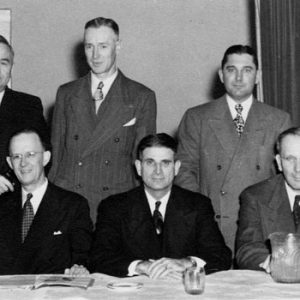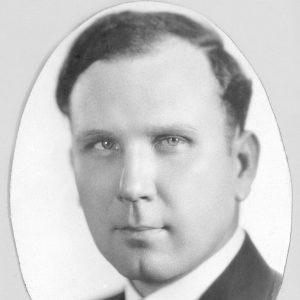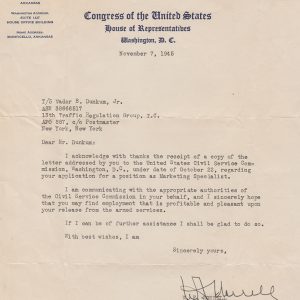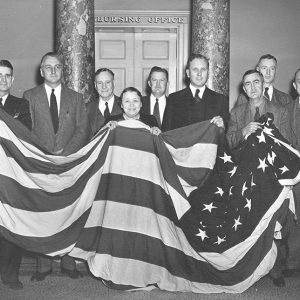calsfoundation@cals.org
William Frank Norrell (1896–1961)
Congressman William Frank Norrell served southern Arkansas and the entire state during an important time in the region’s economic and social development. He was the first World War I veteran to be elected to Congress from Arkansas.
William F. Norrell was born in Milo, a small community in Ashley County, on August 29, 1896. His parents were farmers John H. Norrell and Elvie Richardson Norrell. He attended the local public schools and pursued higher education at the Fourth District State Agricultural School of Monticello (Drew County)—now the University of Arkansas at Monticello (UAM)—as well as at the College of the Ozarks (now the University of the Ozarks) at Clarksville (Johnson County) and at what is now the University of Arkansas at Little Rock William H. Bowen School of Law. He was admitted to the Arkansas Bar in 1920. In the middle of his studies, he served in World War I in the Quartermasters Corps of the U.S. Army.
Norrell began practicing law in Monticello in 1920. He married Catherine Dorris in 1922. They had one child. After Norrell began practicing law in Monticello, but before his election to Congress, he was a leader in the local Ku Klux Klan.
In 1930, Norrell was elected to the Arkansas state Senate. He served as president pro tempore of the Senate from 1934 to 1938, when he ran for the U.S. Congress in Arkansas’s Fourth Congressional District. Norrell was a strong Democrat and served during the Seventy-sixth Congress and in the eleven succeeding Congresses, a period covering January 3, 1939, until his death in 1961. He was a longtime member of the U.S. House Committee on Appropriations, serving on the Subcommittee for Military Appropriations. In that capacity, he made several official international trips. He was present, for example, during the first phase of Operation Crossroads, the nuclear bomb tests at Bikini Atoll in 1946 where the battleship USS Arkansas (BB-33) was sunk. Again, during 1949, he traveled to Asia, inspecting progress made in rebuilding postwar Japan and Korea. He supported America’s nuclear energy program and personally inspected nuclear-powered American naval vessels, viewed experimental aircraft (such as nuclear bombers), and visited North Atlantic Treaty Organization (NATO) defense forces in Europe.
Norrell was a strong supporter of flood control programs, including the major projects in Arkansas and the development of the state’s waterways, the largest of which became known as the McClellan-Kerr Arkansas River Navigation System. He also successfully introduced the bill officially designating Arkansas Post as a national memorial.
Norrell experienced partial paralysis following his first stroke in 1954, and his health suffered tremendously after that. His second stroke occurred while he was in Washington DC, and he died two days later, on February 15, 1961. Norrell was buried in Arkansas, at the Oakland Cemetery in Monticello. His wife was elected in a special election to fill his seat and served the remainder of his term in Congress.
For additional information:
Holley, Donald. “A Look behind the Masks: The 1920s Ku Klux Klan in Monticello, Arkansas.” Arkansas Historical Quarterly 60 (Summer 2001): 131–150.
Russell, Phillip. “William Frank Norrell: Congressman from Monticello.” Drew County Historical Journal 12 (1997): 46–49.
William F. and Catherine D. Norrell Papers. Special Collections. University of Arkansas Libraries, Fayetteville, Arkansas.
“William Frank Norrell.” Biographical Directory of the United States Congress. http://bioguide.congress.gov/scripts/biodisplay.pl?index=N000137 (accessed February 7, 2022).
Kay C. Goss
Alexandria, Virginia



 Ben Laney with Congressional Delegation
Ben Laney with Congressional Delegation  William Frank Norrell
William Frank Norrell  Norrell Letter
Norrell Letter  Senators and Representative: 1938
Senators and Representative: 1938 



Comments
No comments on this entry yet.